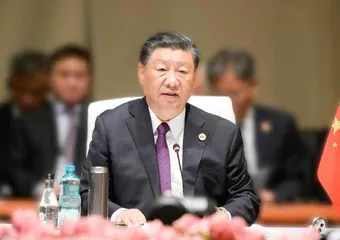Working Together to Build a Modern Global South
作者: Liu Jianchao

The world today is confrontedwith accelerated changesunseen in a century. An im- portant feature of the changes is that the collective rise of developing countries is gaining momentum. The rise of developing countries as a whole is based on and reinforced by their collective modernization. Thus an indepth discussion on the mod- ernization of the Global South is ur- gently needed. It responds not only to the call of developing countries for peace, development and progress, but also to the aspiration of people of all countries for modernization and human advancement.
FIRST, THE GLOBAL SOUTH ISWHERE THE HOPE LIES AMID THE ONCE-IN-A-CENTURY CHANGES.
The term “Global South” has first and foremost a “South” dimension. However, “South” is not a geographi- cal term but a byword for emerging markets and developing countries. It is an identity and represents a com- munity of countries with similar his- torical experience, political pursuits and development goals. The term also has a global dimension. It symbolizes a prominent worldwide trend of the collective rise of developing countries and reflects their strong wish for soli- darity and self-reliance. Countries of the Global South once suffered from aggression, suppression and plunder. It was through years of struggle and hard work and along with the evolving changes of the century that the Global South has gradually become an important force driving the re- forms of the international order and calling for political independence, na- tional rejuvenation, and international justice.
The Global South is a leading champion for a new type of globali- zation. In today’s world, unilateral- ism, protectionism, and populism are rearing their ugly heads. Attempts to build small yards with high fences, to decouple and cut chains and to stoke bloc confrontation are rampant. Glo- balization has suffered major setbacks and we have to make critical choices to avoid being pushed back like sail- ing upstream. At this crucial moment, countries of the Global South have chosen to confront difficulties head on. They have embraced globalization in an unprecedented manner. They launched mechanisms to improve glo- balization by enriching its content and extending its outreach, and endeav- ored to make the rules of globalization more reasonable and conditions more favorable. In particular, countries of the Global South, upholding the prin- ciple of “planning together, building together, and benefiting together”, have pressed ahead the Belt and Road cooperation to a new stage of high- quality development, thus injecting new impetus into global growth, creating new opportunities for global development, and building a new plat- form for international cooperation. Thanks to these efforts, a new type ofglobalization that involves more di- versified players and is more open, in- clusive, and beneficial for all is taking shape. Globalization has indeed been tinted with the Global South hues.
The Global South is the sourceof strength for world multi-polarity.
Since the end of the Cold War, the trend of world multi-polarity has evolved amid twists and turns. Along with the unfolding of profound changes in the global economic and political landscape and the collec- tive rise of developing countries, the Global South has been presented with an important opportunity to play a greater role. According to statistics, the land area of all Global South countries accounts for more than 70% of the world’s total. Their combined population and contribu- tion to global economic growth over the past 20 years account for 80% of the world’s total. It is fair to say that the Global South has already become the most dynamic force in the process of multi-polarity in terms of its size, vitality, growth potential and contribution. The collective rise of the Global South is reshaping the global political landscape.
The Global South is a key force to promote greater democracy in international relations. Over the years, the voice of the Global South has been muted on the world stage and the reasonable concerns of de- veloping countries have never been addressed. A few traditional powers have dominated the right to set international agenda and rules. They only put their own interests first. Their he- gemonic, domineering and bullying practices have disturbed the normal international order and undermined international justice and fairness. Un- der the new circumstances, more and more Global South countries have re- alized the ideological and institutional yoke of imperialism and colonialism. They are more determined than ever to adopt strategic autonomy, practice true multilateralism and promote greater democracy in international relations. By doing so, countries of the Global South have gained a greater say on the international stage and added stronger impetus to the reform of the global governance system.
SECOND, WORKING TOGETHER TO ADVANCE MODERNIZATION IS WHAT THE GLOBAL SOUTH MUST DO TOACHIEVE GREATER COLLECTIVE STRENGTH THROUGH UNITY.
To realize modernization is a shared pursuit of all countries of the Global South. To build a better world, the Global South must work together to pursue, advance and realize mod- ernization. They must aim at building a strong and modern Global South so as to propel the progress of human civilization and the building of a hu- man community with a shared future.
The Global South must unite in removing the spell that “the weak get weaker”. The modernizationprocesses of countries are not syn- chronized. As countries of the Global South were once exploited, plundered and suppressed by imperialists and colonizers and they started to grow their economy relatively late with weak foundation, they are the late comers in the process of world mod- ernization. In an international system that is neither fair nor reasonable, the North-South divide continues widen- ing, which proves more true than ever the Matthew Effect that the rich get richer and the poor get poorer. Coun- tries of the Global South find it more complicated and difficult to achieve modernization. Each country acting on its own cannot make it. Working together is the right way forward.